Korean recipes: Goldongban bibimbap
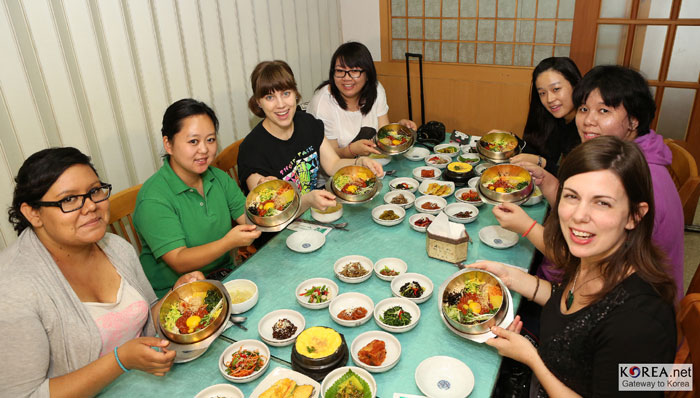 Bibimbap is one of the most popular Korean dishes enjoyed by non-Koreans.Depending on what ingredients you add and
Bibimbap is one of the most popular Korean dishes enjoyed by non-Koreans.Depending on what ingredients you add and
how you mix it, you can make your own bibimbap to your taste and enjoy the harmony created by all the ingredients.
Bibimbap is one of Korea’s most iconic dishes that can be said to represent much of Korean cuisine, along with kimchi and grilled bulgogi marinated beef.
In fact, bibimbap was enjoyed by all social ranks, ranging from commoners and farmers through to yangbanaristocrats and even the kings. Courtiers called it goldongban as it was written with Chinese characters as 骨董飯, which means “rice mixed with various side dishes.” It was served for lunch or for relatives of the king who visited the palace. Yangban aristocrats made bibimbap after they held an ancestral rite. They used all the smaller dishes served on the ancestral rites table in their bibimbap. Commoners enjoyed bibimbap on Lunar New Year’s Eve so that all the food remaining after dinner could be consumed within the day before the Lunar New Year’s Day. Farmers used to make bibimbap as a snack when they worked in the field. They put boiled barley in a wooden bowl and added green herbs and red pepper paste.
Bibimbap can include both meat and greens. It’s very nutritious, as it contains the five main nutrients, such as protein, carbohydrates and fat. Thanks to its range of ingredients, the dish has a balance of colors and tastes, as it includes the five traditional colors of Korean cuisine, the obangsaek, meaning the five directional colors in Chinese characters, 五方色, and the five main tastes, or omi (五味), that are sweet, hot, sour, salty and bitter. The taste of bibimbap can differ as it depends on what ingredients you use, how much chili pepper paste you add and how well you mix them all together. Anyone can make their own bibimbap according to their individual taste and enjoy the fun of mixing and creating a meal that has a unique taste all of its own.
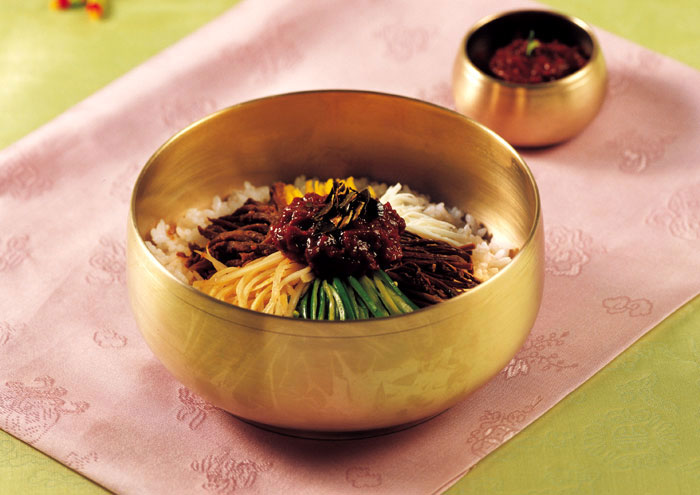 Bibimbap is a dish that balances the five colors and the five tastes, pleasing both your mouth and your eyes.
Bibimbap is a dish that balances the five colors and the five tastes, pleasing both your mouth and your eyes.
*** How to make bibimbap
** Ingredients
450 grams (2.5 cups) non-glutinous rice
600 grams (3 cups) water
300 grams zucchini
2 grams (0.5 teaspoons) salt
200 grams skinned bellflower roots
4 grams (1 teaspoon) salt
120 grams beef (top round)
200 grams soaked bracken
- seasoning sauce:
18 grams (1 tablespoon) soy sauce
6 grams (0.5 tablespoons) sugar
9 grams (2 teaspoons) minced green onion
5.5 grams (1 teaspoon) minced garlic
2 grams (1 teaspoon) sesame salt
0.3 grams (0.125 teaspoons) ground black pepper
4 grams (1 teaspoon) sesame oil
2 (120 grams) eggs
3 grams kelp
26 grams (2 tablespoons) oil -
fried red pepper paste:
95 grams (5 tablespoons) red pepper paste
20 grams minced beef
9 grams (2 teaspoons) minced green onion
5.5 grams (1 teaspoon) minced garlic
90 grams (6 tablespoons) water
18 grams (1.5 tablespoons) sugar
19 grams (1.5 tablespoons) sesame oil
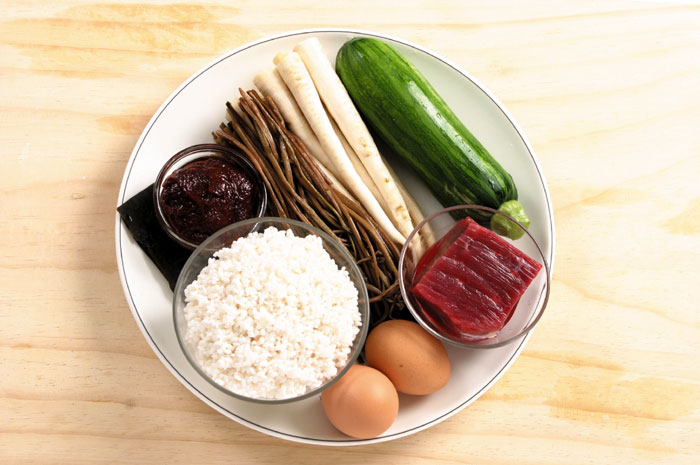 The main ingredients in bibimbap are non-glutinous rice, zucchini, eggs, beef, bellflower roots and red pepper paste.
The main ingredients in bibimbap are non-glutinous rice, zucchini, eggs, beef, bellflower roots and red pepper paste.
** Preparation
1. Wash the rice. Soak it in water for 30 minutes. Drain the water through a strainer for 10 minutes.
2. Cut the zucchini into 5- or 6-centimeter slices, and then cut them into 0.3-centimeter thick rounds. Shred them into matchsticks. Soak them with salt for 10 minutes. Wipe away the water with a cotton cloth. Shred the bellflower roots into 5- or 6-centimeter long and 0.3-centimeter wide slices. Add salt and use your hands to make sure they’re all well coasted. Let it sit for 10 minutes. Rinse and squeeze out any water.
3. Clean off any blood in the beef with a cotton cloth. Shred the beef into 6-centimeter long and 0.3-centimeter thick slices. Wash the bracken. Cut it into 5-centimeter long strips. Season the beef and the bracken with the seasoning sauce.
4. Separate an egg into the yolk and the white and fry them each separately. Shred each into 5-centimeter long strips that are 0.3 centimeters wide.
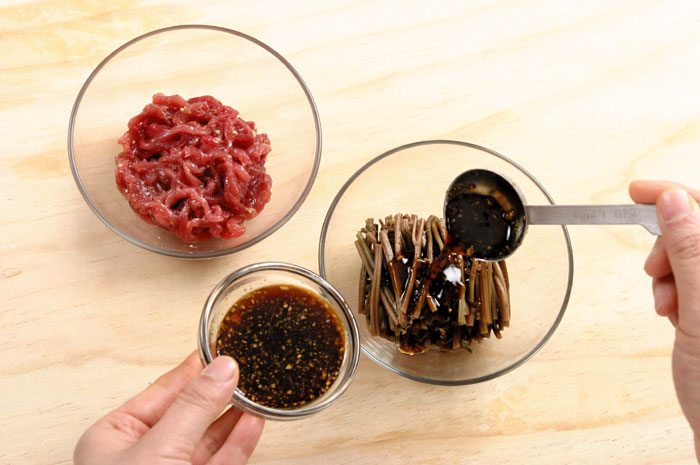 You need to remove the blood from the beef and wash the braken before cutting them all up and adding
You need to remove the blood from the beef and wash the braken before cutting them all up and adding
the seasoning sauce to the beef and the braken separately. You could skip the seasoning sauce, according to taste.
** Recipe
1. Put the rice and water in a pot and heat it for 4 minutes over a high heat. When it boils, continue to boil it for another 4 minutes and then lower the heat to medium and let it simmer for 3 minutes. When the rice becomes sodden, lower the heat to low and steam for 10 minutes until it is well done.
2. Preheat a frying pan with oil. Stir-fry the pumpkin over a high heat for 30 seconds and then spread it out and let it cool down.
3. Preheat a frying pan with oil. Stir-fry the bellflower roots over a medium heat for 5 minutes.
4. Preheat a frying pan with oil. Stir-fry the beef and bracken separately over a medium heat for 3 minutes.
5. Pour a bit of oil into the pan. Fry the kelp over a medium heat for 10 seconds and then crush it into large pieces.
6. Put the minced beef, green onion, garlic and half of the sesame oil into the pot. Stir-fry it all over a medium heat for 2 minutes. Add the red pepper paste, sugar and sesame oil. Stir-fry for 5 minutes. Add the water. Stir-fry for another 3 minutes to fry the red pepper paste.
7. Serve over steamed rice with all the prepared ingredients and the fried red pepper paste on top.
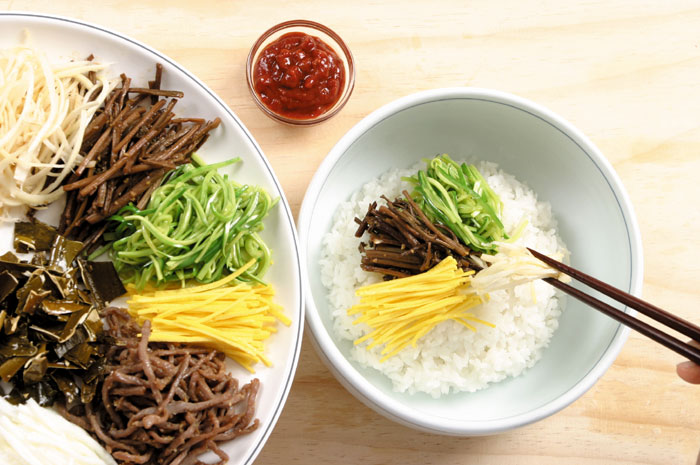
Put some cooked rice in a bowl and add the prepared meat and other ingredients along with some red pepper sauce.
To make it taste great, the rice should be cooked properly, neither too hard nor too watery.
You can add or subtract the fried red pepper paste, depending on your taste.
Korea.net Staff Writer
In cooperation with the Institute of Traditional Korean Food (ITKF)
Content from “The Beauty of Korean Food: 100 Best-Loved Recipes”
arete@korea.kr
RELATED TOUR
